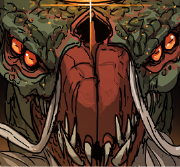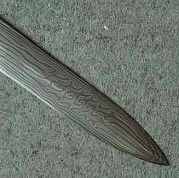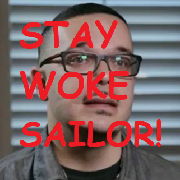|
I don’t know how you are all defining religion but the activities of the elves in Rivendell is clearly religious to me They got up and withdrew quietly into the shadows, and made for the doors. Sam they left behind, fast asleep still with a smile on his face. In spite of his delight in Bilbo’s company Frodo felt a tug of regret as they passed out of the Hall of Fire. Even as they stepped over the threshold a single clear voice rose in song. A Elbereth Gilthoniel, silivren penna miriel o menel aglar elenath! Na-chaered palan-diriel o galadhremmin ennorath, Fanuilos, le linnathon nef aear, sí nef aearon! Frodo halted for a moment, looking back. Elrond was in his chair and the fire was on his face like summer-light upon the trees. Near him sat the Lady Arwen. To his surprise Frodo saw that Aragorn stood beside her; his dark cloak was thrown back, and he seemed to be clad in elven-mail, and a star shone on his breast. They spoke together, and then suddenly it seemed to Frodo that Arwen turned towards him, and the light of her eyes fell on him from afar and pierced his heart. He stood still enchanted, while the sweet syllables of the Elvish song fell like clear jewels of blended word and melody. ‘It is a song to Elbereth,’ said Bilbo. ‘They will sing that, and other songs of the Blessed Realm, many times tonight. Come on!’ That seems like the belief in and worship of a superhuman power or powers, especially a God or gods.
|
|
|
|

|
| # ? May 9, 2024 10:00 |
|
euphronius posted:I don’t know how you are all defining religion but the activities of the elves in Rivendell is clearly religious to me It's the way that it's portrayed as just part of how elves roll. In Bilbo's words in the same scene, "this is merrymaking not business". Singing songs about the west and the gods isn't some big special sacred thing for them–or put another way, everything is big, special and sacred to elves, and singing songs of the west and the gods are just what they like to do. The (modern, western, christian or post-christian) idea of a division of life into religious and secular spheres doesn't exist for them. When Tolkien was first fleshing out elvish vocabulary in the 1910s' "Qenya Lexicon", he includes a lot of very interesting glosses for Christian ideas, including worship, monk, nun, the persons of the Trinity, gospel ("evandilyon", a clear sign of greco-elvish cultural interchange!). But virtually none of this is retained into the later developments of Quenya and Sindarin, for the simple reason that elves have no worship, nor any of the other ideas just cited. As Gandalf points out in another context, they exist in both material and spiritual worlds at once. The word worship is only used in Lord of the Rings to describe one's attitude towards overpowering evil: Frodo's vision of Galadriel as Lord of the Ring is "worshipful", Gollum worships Shelob, the mountain-men and Black Numenoreans worship Sauron. skasion fucked around with this message at 18:01 on Jan 29, 2023 |
|
|
|
Bilbo says it’s merrymaking but it’s clear to me that that is worship. I don’t think I have to take Bilbo literally there. The elves aren’t going tra la la la . Bilbo is a hobbit and is pretty casual and joking about things. But even Bilbo is deeply serious about the whole thing if you look at his poem about earendil which immediately preceded that scene I quoted. It wasn’t a particularly merry poem. I agree the elves are not doing religion like how mainline Protestants or Catholics do it although sitting together and signing songs about god(s) is a common practice even in those groups.
|
|
|
|
Bilbo can also be incorrect or not fully understanding the worship, as the hobbits do not have worship at all, not even something like the debatably ambiguous elven singing. Alternatively, he could see worship as a form of merrymaking: I could see the hobbits essentially venerating the idea of joy in others' company. Ravenfood fucked around with this message at 20:19 on Jan 29, 2023 |
|
|
|
From the OSHA thread.
|
|
|
|
Reminds me how Sean Bean read the line "they have a cave troll", like "can you believe these guys?"
|
|
|
|
Alhazred posted:Reminds me how Sean Bean read the line "they have a cave troll", like "can you believe these guys?" That line right there was another of the moments where I thought to myself "okay, these guys know how to make a movie out of this stuff"
|
|
|
|
|
Alhazred posted:Reminds me how Sean Bean read the line "they have a cave troll", like "can you believe these guys?" its one of my favorite little moments, and it does a ton to communicate to a non-book reader that people in this world do interact with such things, even if rarely. hes not losing his head with fear or confounded by the troll's existence, he is just properly dismayed that poo poo keeps getting worse. It also then helps get across how scary the balrog is when even Legolas is outright scared of it.
|
|
|
|
They have a cave troll! They have a cave troll? They have a cave troll.
|
|
|
|
Rereading RotK and I'm struck by how much I enjoy the version of Saruman at the end of the book. He's so spiteful, so petty and pathetic. He is given so many chances to repent and still he chooses to be a poo poo, even in the smallest ways, like stealing Merry's weed pouch. There's something about seeing this mighty figure reduced to such impotent vindictiveness that is weirdly compelling.
|
|
|
|
Reset Smith posted:Rereading RotK and I'm struck by how much I enjoy the version of Saruman at the end of the book. He's so spiteful, so petty and pathetic. He is given so many chances to repent and still he chooses to be a poo poo, even in the smallest ways, like stealing Merry's weed pouch. There's something about seeing this mighty figure reduced to such impotent vindictiveness that is weirdly compelling. Wonder if Merry looted his pouch back after Saruman got his throat cut. Also kind of curious what poor hobbit(s) got stuck cleaning up the creepy body that a giant mist ghost came out of, too.
|
|
|
|
That troll had clearly never been in a fight before; flailing around getting cut up by each of the nine, only managing to stab 1 guy and even then only hard enough to knock the wind out of him, just real amateur hour stuff
|
|
|
|
Pham Nuwen posted:They have a cave troll! They have a cave troll.
|
|
|
|
Kassad posted:They have a cave troll-la-la-lally.
|
|
|
|
Did Tolkien ever talk about why the timespan of the Middle-earth stories is so vast, or how it came about? Did he sit down one day and think "Yeah, 3000 years sounds good, or was it a gradual thing?
|
|
|
|
Safety Biscuits posted:Did Tolkien ever talk about why the timespan of the Middle-earth stories is so vast, or how it came about? Did he sit down one day and think "Yeah, 3000 years sounds good, or was it a gradual thing? Tough question to answer. It was gradual and it’s hard to say what motivated it exactly. In earlier stages of the writing of LOTR it definitely wasn’t 3000 years. In early drafting there is no established timeline at all and dates are all relative and sometimes very vague. At some points it seems like only a few lifetimes were envisioned between Elendil and Aragorn. In one draft version of the Argonath scene, the Strider-character identifies himself as “Eldamir [=elfstone] son of Eldakar son of Valandil” where the published version has “Elessar, the Elfstone son of Arathorn of the House of Valandil Isildur’s son, heir of Elendil”. Christopher comments that he thinks this suggests Eldamir is literally supposed to be Isildur’s great-grandson, (the character name of Valandil has already been applied to Isildur’s son at this stage) which isn’t the only viable reading imo but at the very least stresses that the whole enormous list of kings and history of Gondor and Arnor had not been worked out. Which probably shouldn’t be surprising—at this stage in the writing the former was still called Ondor and the latter didn’t exist. When the companions arrive at the golden hall of the king of Rohan, though, Tolkien starts working things out a little more precisely. So when Legolas and Aragorn observe the mounds of the former kings, Legolas reflects, quote:Seven mounds there be, and seven long lives of men it is, since the Rohiroth came hither from the North. Two hundred times and more have the red leaves fallen in Mirkwood in my home since then, and little change does it seem to us. But to them it seems so long ago, that their dwelling in the North is but a memory of song, and their speech is already sundered from their northern kin. In Two Towers as published there are seven mounds and nine, grouped in two dynasties, and Legolas upgrades his count to five hundred years while noting it still doesn’t sound like that long to him. (The speech is also shuffled around and partly given to Aragorn, I guess because why would Legolas know anything about Rohirric history). So now we have it established that Rohan was established a couple hundred years ago. What caused it to be established? In the published LOTR, it’s explained that the stewards gave their Rohirric allies land to settle after the Battle of the Field of Celebrant. There is a moment in the golden hall where the companions see a tapestry of Eorl the Young, founder of the kingdom, riding off to battle there. But in the drafts Aragorn does not say that it’s him riding to the Field of Celebrant, but the Field of Gorgoroth: that is to say, the battle at which the Rohirrim won their kingdom was THE battle, the one where Elendil and Gil-galad went to Mordor overthrew Sauron. Two hundred years ago. This is subject to expansion in the course of the Gondor material (particularly important here is the inclusion of Faramir) which suggests a much longer history for the Numenorean kingdom—long enough for a number of kings and then a succession of stewards, not to mention a more general civilizational decline. But the actual timescale is never stated to be on the order of thousands of years. It’s more like this arises slowly and out of sight as Tolkien thinks about the historical ramifications of the established Numenorean tendency to live to extremely old ages. The Shire-reckoning calendar was used first by Tolkien (for internal timekeeping) rather than the more familiar divisions of the ages that we see in the LOTR appendices. So when you see dates cited during the drafting (rarely), they tend to place the action of the book in the early 15th century. It’s unclear why he chose this dating scheme. He doesn’t refer to it as the Shire-reckoning until later in the development of LOTR. Christopher doesn’t say this, but I wonder if at the earliest stage it was just intended as a date in years of the sun. IE, it’s literally supposed to be 1500 years after Morgoth kills the trees and kicks off the return of the Noldor. It would fit in the timescheme (Morgoth gets wrapped up by the Valar in 597 according to the then-extant Later Annals of Beleriand, which gives a respectable couple hundred years each for Numenor and Gondor to exist afterwards). Anyway, the use of these dates became more and more natural to Tolkien as he worked with them and they actually break through into the story itself by the end (think all the hobbits at the end talking about what a good year 1421 was or whatever). And as Sauron is defeated and Aragorn restored to the throne Tolkien also begins to think about the world-historical importance of this and starts using the parlance of the Ages a fair bit more (the words “Third Age” do not occur anywhere in LOTR between the Prologue and the chapter “The Steward and the King”). This probably necessitates the explanation that the given dates are part of a hobbit calendar that doesn’t mean anything on a grand scale. And I think it’s fair to say that Tolkien had increasingly been envisioning the gap between Aragorn and Elendil as a lot longer than 200 years. But it’s only after LOTR is complete, when the appendices are being prepared, that how much longer—the familiar chronology of 6000+ years with king lists to prove it—is firmly established.
|
|
|
|
While that's all good stuff I feel like that wasn't the question — less about LotR itself and more about Tolkien's entire legendarium. The answer to which is that LotR came far, far later in his life than what became the Silmarillion. He wrote The Hobbit in 1937 and LotR in the 50s, and they both started out as small self-contained stories. But he ended up framing them within his much larger, much older back-history that he'd been writing since like 1915. And the whole impetus for those oldest stories was to create a "mythological history for England", or (since that itself is kind of a later characterization of it) a fresh reimagining of Celtic and Brittonic faerie myths and a place for him to play around with his constructed languages, and that meant building a runway for which those old stories could coexist in the same universe as our human world. A timeline long enough for Elves and Men to have lived together, and for Men to have forgotten what Elves were except in dim and garbled fancies, meant that his stories had to have taken place hundreds of years ago at the very latest — long enough for the Elves to be visited by a Man from the age of pre-Anglo-Saxon Britain and to hear their much-older stories. And as he reworked those ideas the timescale got longer and longer, as he incorporated concepts like Atlantis, the Flood, Creation itself, and the separate fates of Elves and Men who by necessity needed to have even longer apart in order for that mythical past to be far enough away from us to have fully forgotten it. To say nothing of the linguistic engine that drove his whole work; he wanted enough time for Quenya and Sindarin to diverge to mutual unintelligibility, for Mannish languages to rise and bifurcate, for enough space to exist in which to place all the linguistic diversity he wanted to populate his world with in the first place. And when it comes to language evolution, time is space. I think the short answer is just that he had always wanted the timescale of Middle-earth to be long beyond human comprehension, because that's exactly why he created it: to fit it within our world, yet for us today to have plausibly forgotten all these events that had taken place in our own distant history. Data Graham fucked around with this message at 16:43 on Feb 9, 2023 |
|
|
|
|
Safety Biscuits posted:Did Tolkien ever talk about why the timespan of the Middle-earth stories is so vast, or how it came about? Did he sit down one day and think "Yeah, 3000 years sounds good, or was it a gradual thing? I think if he'd actually attempted to write a narrative version of events he would have condensed things down to decades. Like so much happens in the Lord of the Rings, the bulk of it over the course of a a year. If he'd decided to do a book or trilogy on the 2A he'd either have had to stick with the nothing much happened for a long rear end time, or revise his timeline down to sonething a bit snappier.
|
|
|
|
It's also quite likely that he's mimicking biblical and world historical timelines. We in the western, European, "judeo-christian" world have about three thousand years of recorded history before things get fuzzy. That's changing a bit with archeological advances but, like, Homer to Tolkien, you're talking what, about 2, 700 years or so? The earliest record of "Israel" existing is about 1200 bc?
Hieronymous Alloy fucked around with this message at 14:02 on Feb 9, 2023 |
|
|
|
|
keep punching joe posted:I think if he'd actually attempted to write a narrative version of events he would have condensed things down to decades. I see an opposite tendency tbh. The earliest annals compress the whole “First Age” into 250 years, but as he rewrites it more and more he sticks another couple hundred years into the siege of Angband so we end up at 500 (eventually 590). Similar thing happens with Numenor or Gondor, they start out on a pretty restricted timescale but as he writes more about them and comes up with more ideas, can’t resist giving them millennia of history. Hieronymous Alloy posted:It's also quite likely that he's mimicking biblical and world historical timelines. We in the western, European, "judeo-christian" world have about three thousand years of recorded history before things get fuzzy. That's changing a bit with archeological advances but, like, Homer to Tolkien, you're talking what, about 2, 700 years or so? The earliest record of "Israel" existing is about 1200 bc? The motif of the 3000 year age is also found earlier in Tolkien mythology—there were 3000 (Valian) years in the earliest Annals of Valinor, from the creation to the arrival of Fingolfin in Beleriand. Even that amount (=30,000 solar years) wasn’t enough for him though, the latest timelines end up with like 45,000. skasion fucked around with this message at 14:51 on Feb 9, 2023 |
|
|
|
From a reception perspective rather than a production point of view, there seems to be an accretion of layers of antiquity - As the Anglo-Saxons were to Tolkien, the Romans were to the Anglo Saxons and then backward through a succession of other legendary figures and ages in a similar logic - Alexander, Achilles, Judea, Moses, Egypt, Noah, and even into Antediluvian time and Prelapsarian time/
|
|
|
|
skasion posted:Tough question to answer. It was gradual and it’s hard to say what motivated it exactly. In earlier stages of the writing of LOTR it definitely wasn’t 3000 years. In early drafting there is no established timeline at all and dates are all relative and sometimes very vague. [...] But it’s only after LOTR is complete, when the appendices are being prepared, that how much longer—the familiar chronology of 6000+ years with king lists to prove it—is firmly established. Thanks for your excellent post. It's a bit frustrating that he seems to not have talked about the why of it, though. At first glance it makes sense to have thousands of years of myth shading into history, but thinking more, the Greek heroic age was only a few generations, I think, and the Bible is usually quite restrained in scale - often it's just one family, and even its timescale is much shorter than Tolkien's. (Creation 6,000 years ago, yes; but most of the first 2,000 years is glossed over until Abraham, and the main narrative of Exodus-Israel-conquest-return takes place over a few centuries.) Data Graham posted:And the whole impetus for those oldest stories was to create a "mythological history for England", or (since that itself is kind of a later characterization of it) a fresh reimagining of Celtic and Brittonic faerie myths and a place for him to play around with his constructed languages, and that meant building a runway for which those old stories could coexist in the same universe as our human world. A timeline long enough for Elves and Men to have lived together, and for Men to have forgotten what Elves were except in dim and garbled fancies, meant that his stories had to have taken place hundreds of years ago at the very latest — long enough for the Elves to be visited by a Man from the age of pre-Anglo-Saxon Britain and to hear their much-older stories. And as he reworked those ideas the timescale got longer and longer, as he incorporated concepts like Atlantis, the Flood, Creation itself, and the separate fates of Elves and Men who by necessity needed to have even longer apart in order for that mythical past to be far enough away from us to have fully forgotten it. CommonShore posted:From a reception perspective rather than a production point of view, there seems to be an accretion of layers of antiquity - As the Anglo-Saxons were to Tolkien, the Romans were to the Anglo Saxons and then backward through a succession of other legendary figures and ages in a similar logic - Alexander, Achilles, Judea, Moses, Egypt, Noah, and even into Antediluvian time and Prelapsarian time/ Things like this make sense, but sometimes the fairly static history makes the opposite effect. If Gondor is 3,000 years old, it looks more like he's just throwing big numbers around. It's odd that Elrond looks at Sting, supposedly from Gondolin 6,000 years old, and lets Bilbo waltz off with it. The changing of empires you see in real history isn't there and it creates shallowness that he's really good at avoiding elsewhere. Vague ideas of "a few generations" gradually stretching makes sense. On the other hand, I suppose it's a blessing he didn't get carried away with that as well.
|
|
|
|
Safety Biscuits posted:Things like this make sense, but sometimes the fairly static history makes the opposite effect. If Gondor is 3,000 years old, it looks more like he's just throwing big numbers around. It's odd that Elrond looks at Sting, supposedly from Gondolin 6,000 years old, and lets Bilbo waltz off with it. The changing of empires you see in real history isn't there and it creates shallowness that he's really good at avoiding elsewhere. Vague ideas of "a few generations" gradually stretching makes sense. On the other hand, I suppose it's a blessing he didn't get carried away with that as well. Sometimes I joke that whenever a fantasy writer starts measuring time in millennia I mentally divide every number by 10, but OTOH having these dynasties reign for that long unbroken is intended to also evoke a larger-than-life character, greater than any real life historical entity with its comparatively petty events. Though the "protagonist logic" gets a bit much in some fantasy works when many of these systems and rulers, which ought to be absurdly more stable than anything we know, are brought down in the very short time that the plot spans. It's all supposed to be an apocalyptic contrast, I suppose, an extreme variation of "interesting times".
|
|
|
|
Safety Biscuits posted:It's odd that Elrond looks at Sting, supposedly from Gondolin 6,000 years old, and lets Bilbo waltz off with it. I don’t entirely disagree with other parts of your post, though I don’t completely agree either. But this here is, like, the whole point of the books. The whole point is that nice poo poo is nice, but you let it go freely and don’t try and take other people’s nice poo poo. Being obsessed with who has the right to the shinies is pretty much the most the best paved road to perdition in the legendarium.
|
|
|
|
Tolkien doesn't really spell this out but an angle I like to take from the vibe of it is that people like Elrond's internal monologue is something like: Ah so this is the great tale of our Age, is it? Then take these great and ancient talismans that have just been sitting untouched in nearby caves and in my library, they weren't doing any good there and obviously whatever you do with them will make for a great story
|
|
|
|
|
Deptfordx posted:As I say, I didn't like the off the cuff Covid performance of the Hobbit, but I'm perfectly prepared to believe Serkis is decent with prep.
|
|
|
|
The three-thousand-year gap between Isildur and Aragorn in particular is especially ridiculous. In the same way that pretty much every caucasian person is descended from Charlemagne 1200 years ago, surely pretty much every human in Middle-earth is descended from Elendil after 3000?? Sure, by the strict rules of male firstborn succession, there can technically be only one official "heir," but lmao at putting special significance on that after two thousand years of Anarion's bloodline ruling Gondor and a thousand years of stewards. It'd be like someone showing up in modern-day Iraq and saying "hey guys I'm the true heir of Ashurbanipal, my bloodline has been living in Greece for the last three thousand years, anyway i would like to be king of
|
|
|
|
Sorry if this is disjointed I'm writing this in between working The way i have always interpreted the extreme long periods in Tolkien is that as a literally hand created world, Middle Earth does not have certain things freely available to really rocket industry forward. Yes I know Tolkien envisioned it as the real world, but as this discussion is showing there really is no way to square that circle in the end as Tolkien was just a guy and not perfect. For me I just handwave that as a nice thought but as far as i interpret Middle Earth, it is as a separate fantasy world like westeros or whatever. And to me, a lack of technological change is the only real explanation for the lack of a more realistic pace of change for empires, nations, city states, etc rising and falling and just more stuff happening. So to me, oil and coal don't exist (i think coal gets referenced like once in The Hobbit), and saltpeter has not had time to leech out of cave walls in large amounts. So fossil fuels and gunpowder are off the table. That of course only explains a portion of the stagnation, and to me the rest of it is due to the fact that both elves and men were dependent on the Valar, at least initially, to be taught everything. They were shown what the Valar decided to teach them, and in general that was only taught to a portion of those people. The moraquendi receiving far less than the calaquendi for instance. This would lead to a lot of ritualization of that knowledge, and in the real world we can find examples of peoples abandoning prior technologies or not adopting some that were used very close by. It is not a huge stretch to me that both Elves and Men would exalt any knowledge gained from the Valar as sacrosanct and "improving" it being a dangerous road to go down. Obviously Feanor did it, and look what happened to him! Same for the Numenoreans, Eol, etc. And as for the rest of the wider world, most of the peoples have existed for only a few thousand years. In our world, the Bronze Age in Mesopotamia lasted over 2,000 years, and even then it took iron hundreds of years to be used extensively. So for the various scattered societies throughout middle earth, most got dropped into the world at the hunter gatherer stage with a smattering of knowledge from the Valar and then have just been winging it. Various things would have been spreading around, especially once the Noldor show up with all the fancy poo poo from Valinor. Agriculture, tools, etc all seem to have been there from the start, but it took humanity a long time to actually make some of the advancements that then led to the ever increasing pace of technology changing. So in general the only peoples that had a relatively "normal" pace of advancement were the Elves and Numenor. And until the end of the second age, things in Middle Earth were trending towards a less extreme tale of years. Numenor started a small island community of refugees and within a millennium had grown to a seafaring naval power. it then started colonizing other parts of the world, and things seemed to be on track for a more normal processing of events from say, Antiquity to the Renaissance, ~1,500 years. That's exactly when Sauron forges the rings, and Eriador is destroyed. Now its a bipolar world between Numenor and Sauron, and for 1k years it is an alternating cold/hot war between the only 2 technologically advanced societies, while the rest of the world is being dominated by either side. That then ends with Numenor being completely destroyed and the War of the Last Alliance seeing the rest of middle earth depopulated and devastated. So in the third age, you now have Arnor, Gondor, and the Elves as the only groups with access to good tech, and the rest of the peoples have just been getting upended over and over again. But still the Third Age is where Tolkien just expands the timeline for no real reason. For almost 2000 years almost nothing of note happens until Arnor is destroyed, and then its another thousand years before the events of LOTR. I can't find any good reason to explain how so little happens for thousands of years, short of simply blaming Sauron for blocking Arnor and Gondor from expanding their influence to the wider world.
|
|
|
|
Part of why so much of Middle-Earth we see is desolate and empty (other than the Fellowship deliberately going there - I am sure the south coast of Gondor was probably a pretty happening place) is that there was this huge-rear end plague which killed like, enormous quantities of people and depopulated the North. I think the Rangers also were still "Men" but were like, living to 200 and marrying at 50. So that's gonna bite into your population growth.
|
|
|
|
DontMockMySmock posted:The three-thousand-year gap between Isildur and Aragorn in particular is especially ridiculous. In the same way that pretty much every caucasian person is descended from Charlemagne 1200 years ago, surely pretty much every human in Middle-earth is descended from Elendil after 3000?? Sure, by the strict rules of male firstborn succession, there can technically be only one official "heir," but lmao at putting special significance on that after two thousand years of Anarion's bloodline ruling Gondor and a thousand years of stewards. It'd be like someone showing up in modern-day Iraq and saying "hey guys I'm the true heir of Ashurbanipal, my bloodline has been living in Greece for the last three thousand years, anyway i would like to be king of It would be more like if someone showed up with a huge army and ended all conflict in modern-day Iraq and had the backing of all the major superpowers in the world. I would make him king too.
|
|
|
|
|
Yeah Aragorn's ancestors tried a bunch of times to get the throne back and were told to gently caress off, he had to work at it and have the stars align just right.
|
|
|
|
Alhazred posted:It would be more like if someone showed up with a huge army and ended all conflict in modern-day Iraq and had the backing of all the major superpowers in the world. I would make him king too. I believe someone tried this around 20 years ago
|
|
|
|
Safety Biscuits posted:Thanks for your excellent post. Another difference though is that Middle Earth also has kinds of continuity that historical empires don't, between immortal elves and long-lived dwarves and Numenoreans. Consider the institution of the Steward - in other places the Steward would have become a King, but not in Gondor. It's a moment that focuses on the oddness and exceptionality of Gondor among other human societies, and it's propped up by those fantasy elements. The other jaw-droppingly old society in Middle Earth? Why that's the nearly 2000 year old society in the Shire, which has just trucked along in its good, peaceful Midlands country life with just slow, gradual, sensible changes along the way.
|
|
|
|
Heithinn Grasida posted:I don’t entirely disagree with other parts of your post, though I don’t completely agree either. But this here is, like, the whole point of the books. The whole point is that nice poo poo is nice, but you let it go freely and don’t try and take other people’s nice poo poo. Being obsessed with who has the right to the shinies is pretty much the most the best paved road to perdition in the legendarium. I meant more along the lines of "this is a priceless historical artefact that belongs in a museum" (like the mithril-shirt) than "give me my stuff!" But Data Graham's post is a better interpretation than mine. WoodrowSkillson posted:So to me, oil and coal don't exist (i think coal gets referenced like once in The Hobbit), and saltpeter has not had time to leech out of cave walls in large amounts. So fossil fuels and gunpowder are off the table. That of course only explains a portion of the stagnation, and to me the rest of it is due to the fact that both elves and men were dependent on the Valar, at least initially, to be taught everything. They were shown what the Valar decided to teach them, and in general that was only taught to a portion of those people. The moraquendi receiving far less than the calaquendi for instance. This would lead to a lot of ritualization of that knowledge, and in the real world we can find examples of peoples abandoning prior technologies or not adopting some that were used very close by. It is not a huge stretch to me that both Elves and Men would exalt any knowledge gained from the Valar as sacrosanct and "improving" it being a dangerous road to go down. Obviously Feanor did it, and look what happened to him! Same for the Numenoreans, Eol, etc. Being literally taught by the gods is the most cultural cringe possible. No wonder it's all downhill... Tolkien's thoughts on decline are difficult to get to grips with though because we think about it too literally. He sees technological development (and modernity, really) as evil, and decline as inevitable. Most people see these as decline and development as opposed, and from a literal point of view they are - fewer children, weaker economy, etc. Gondor is in decline because it's underpopulated and has forgotten old techniques... but there's always more orcs, and Saruman is discovering new technology. Good seems passive, Evil active, and from this perspective almost negentropic - easier to identify with. It reminds me of reading Charles Williams' War in Heaven, which has a climax of the hero trusting in God, Who protects him and deals with the villain. I couldn't stand it, and it bored me until I got it - but that point's rather alien to most people (I still don't like the Williams). Actually worrying about the verisimilitude of history or the empty map is silly, even if it bothers me.
|
|
|
|
Safety Biscuits posted:I meant more along the lines of "this is a priceless historical artefact that belongs in a museum" (like the mithril-shirt) than "give me my stuff!" But Data Graham's post is a better interpretation than mine. The “mathom-house” idea is very specifically hobbitish also. This notion that there should be a communal place where one can put items that are too nice or fancy to get rid of, but have no practical use. It’s not clear to me that elves would share this view. We hear of elvish warlords squirreling artifacts away but it doesn’t seem to be to display them for their historical value. In the cases that are explained it’s portrayed as hoarding behavior, greed basically. At best a source of objects to give as personal gifts.
|
|
|
|
I’m thinking and revisiting more about the Silmarillion and a few things stick with me. After Melkor escapes from Valinor and destroys the trees…were the Valar just gonna abandon Middle-Earth to him? Fair enough that they leave the Noldor to their room after the rebellion and kin slaying, that all makes sense, but what of the Sindar and humans to come? Seems immeasurably cruel to have them suffer the collective punishment of the Noldor’s punishment. I get the broad view of things - the protagonists of history move from the more mythical and cosmic to more and more relatable figures, from Valar to Elves to Mankind, but it’s a weird thing. The Valar are aware that no combination of Elf and Man can take down Morgoth, only their own intervention, and yet they let him run around for another 500+ years. What would they have done if not for Feanor? Just let Melkor rule Middle Earth indefinitely? In a way, his rebellion (eventually) forced their intervention.
|
|
|
|
the air fryer house
|
|
|
|
Mike N Eich posted:I’m thinking and revisiting more about the Silmarillion and a few things stick with me. After Melkor escapes from Valinor and destroys the trees…were the Valar just gonna abandon Middle-Earth to him? Fair enough that they leave the Noldor to their room after the rebellion and kin slaying, that all makes sense, but what of the Sindar and humans to come? Seems immeasurably cruel to have them suffer the collective punishment of the Noldor’s punishment. i think i remember reading that the idea was that men were uniquely capable of resisting melkor. at the dagor bragollach turin is supposed to come back from the dead and kill morgoth even though the latter apparently totally pwned him in every way, analogous to how all men can ultimately transcend evil while elves can't really
|
|
|
DontMockMySmock posted:The three-thousand-year gap between Isildur and Aragorn in particular is especially ridiculous. In the same way that pretty much every caucasian person is descended from Charlemagne 1200 years ago, surely pretty much every human in Middle-earth is descended from Elendil after 3000?? Here's a fun fact: Confucius' family tree goes back almost as far as Aragorn's.
|
|
|
|
|

|
| # ? May 9, 2024 10:00 |
|
Mike N Eich posted:I’m thinking and revisiting more about the Silmarillion and a few things stick with me. After Melkor escapes from Valinor and destroys the trees…were the Valar just gonna abandon Middle-Earth to him? Fair enough that they leave the Noldor to their room after the rebellion and kin slaying, that all makes sense, but what of the Sindar and humans to come? Seems immeasurably cruel to have them suffer the collective punishment of the Noldor’s punishment. The Valar already abandoned Middle-earth to him when they first retreated to Valinor. They tried making a paradise in Middle-earth with the Two Lamps and he wrecked it, so they took their paradise off to the west with big natural defenses around it and left him there. They probably didn't think of 500 years as being an especially egregious time to leave Morgoth running around. That's about as long as it took them to do anything about the fact that the original ancestors of the elves were about to wake up in a world ruled by Morgoth in the first place, for example. They spent that time debating what to do while Manwe prayed to God for inspiration. In the end they decide God wants them to save the elves, and they do. But in doing so, their attempts to take responsibility for the elves stores up a load more problems down the line. And of course their eventual attempt to get rid of Melkor destroys all Beleriand and loses the Silmarils and creates a bunch of new problems for the people who remain behind. If the stakes are like that, then it's no wonder they took centuries to do anything. No consolation to the loads of people who got mulched in the wars though. A major theme in almost all of Tolkien's writing is the understandable but disastrous tendency of good people to sit in their good places and ignore everything that happens outside. It's as true of the hobbits of the Shire as of the gods themselves.
|
|
|










































